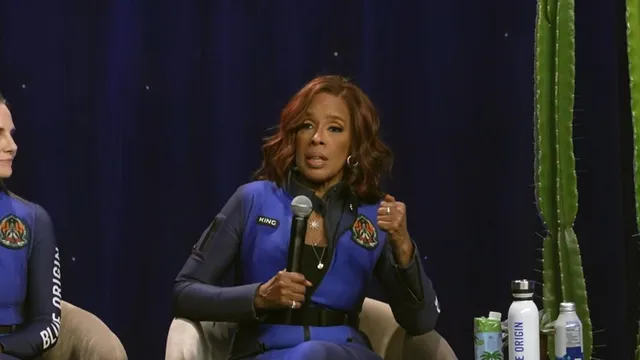
Gayle King experiences life-changing journey to space aboard Blue Origin
2025-04-14 14:44- On April 14, 2025, Gayle King and an all-female crew journeyed to the edge of space aboard Blue Origin's New Shepard.
- The flight, which included notable personalities like Katy Perry and Lauren Sanchez, emphasized the importance of women's representation in space.
- King's emotional experience reflects empowerment and the transformative potential of space travel for women.
Express your sentiment!
Insights
On April 14, 2025, Gayle King, a co-host on 'CBS Mornings', made headlines as she participated in an all-female flight to space aboard Blue Origin's New Shepard spacecraft. The journey marked a groundbreaking event organized by Blue Origin, a private aerospace firm founded by Jeff Bezos, and it took off from West Texas at 8:30 AM local time. The crew, which included notable figures like pop superstar Katy Perry, journalist Lauren Sanchez, and former NASA rocket scientist Aisha Bowe, aimed to highlight female representation in the field of space exploration. Throughout the flight, which lasted a little over ten minutes, the spacecraft reached the edge of space, allowing the team to experience approximately four minutes of weightlessness. Gayle King was visibly emotional during the flight as she urged her fellow crew members to appreciate the extraordinary view from space, making remarks about the Earth below them. Reflecting on her experience after landing, King conveyed a sense of pride and accomplishment, stating she felt she could conquer any challenge. The flight not only fostered a connection among the female crew members but was also a demonstration of women's capabilities in a traditionally male-dominated industry. In a heartwarming moment, Katy Perry performed 'What a Wonderful World' following the weightless segment of their journey, emphasizing the shared significance of their mission. King expressed that the experience changed her and highlighted the importance of stepping out of one's comfort zone. She encouraged others to embrace challenges and seek out new adventures, suggesting her journey would inspire women and girls to recognize their own potential in exploring career paths in science and technology. The successful mission not only achieved its goal of promoting gender equality in space exploration but also captured the hearts of many around the world, showcasing a historic moment in aviation history.
Contexts
The impact of space tourism on society is a multifaceted phenomenon that encompasses economic, environmental, technological, and social dimensions. As private companies like SpaceX, Blue Origin, and Virgin Galactic advance their space tourism offerings, the potential for an emerging market to flourish becomes increasingly apparent. This industry promises to create significant economic opportunities, through job creation in sectors ranging from aerospace engineering to hospitality. The development of infrastructure required to support space tourism could also stimulate regional economies, particularly in areas nearby launch sites. However, the associated costs may remain prohibitive for the average consumer, leading to a potential socioeconomic divide where only the wealthy can access these experiences. This exclusivity could engender societal debates about equity and the distribution of resources in space exploration and tourism, effectively limiting participation to a privileged few while others may feel left out of this new frontier. On the environmental front, space tourism raises critical concerns regarding its ecological footprint. Rocket launches emit greenhouse gases and other pollutants, contributing to atmospheric changes and potentially impacting climate patterns. As awareness of climate change grows, the sustainability of space tourism is called into question, necessitating the development of greener technologies and practices within the industry. The need for balances between progression in space exploration and environmental stewardship is paramount. This challenge is central to discussions of the future landscape of the space tourism industry, posing questions about how to innovate responsibly while minimizing harm to our planet. Technological advancements driven by the demand for space tourism may have far-reaching implications beyond just the sector itself. Innovations in propulsion, materials science, and safety measures stemming from space tourism could translate into improvements across various industries, including commercial aviation, telecommunications, and even healthcare. Moreover, the heightened interest in space may inspire a new generation of scientists, engineers, and entrepreneurs, fostering a culture of innovation and exploration. This rejuvenation of interest in space travel could catalyze educational initiatives aimed at STEM fields, promoting a workforce that is well-prepared to tackle future challenges in both space and Earth-based industries. Socially, space tourism has the potential to change humanity’s perspective on its place in the universe. Experiences that allow individuals to witness Earth from the orbit may foster a greater appreciation for our planet, emphasizing the need for custodianship of its resources. Furthermore, the unique experiences garnered from space tourism could inspire stories and narratives that promote unity and peace, encouraging a collective identity among humanity. As more people venture into space, it could bolster the vision of Earth as a shared home, instilling a widespread sense of responsibility towards one another and the world we inhabit. However, the risks associated with space travel cannot be ignored. Safety concerns and the tragic realities of space accidents highlight the need for rigorous standards and regulations, ensuring that the thrill of exploration does not come at the cost of human safety. Thus, the evolution of space tourism will greatly depend on finding a balance between excitement and responsibility, ensuring its benefits are widely shared and its challenges appropriately addressed.